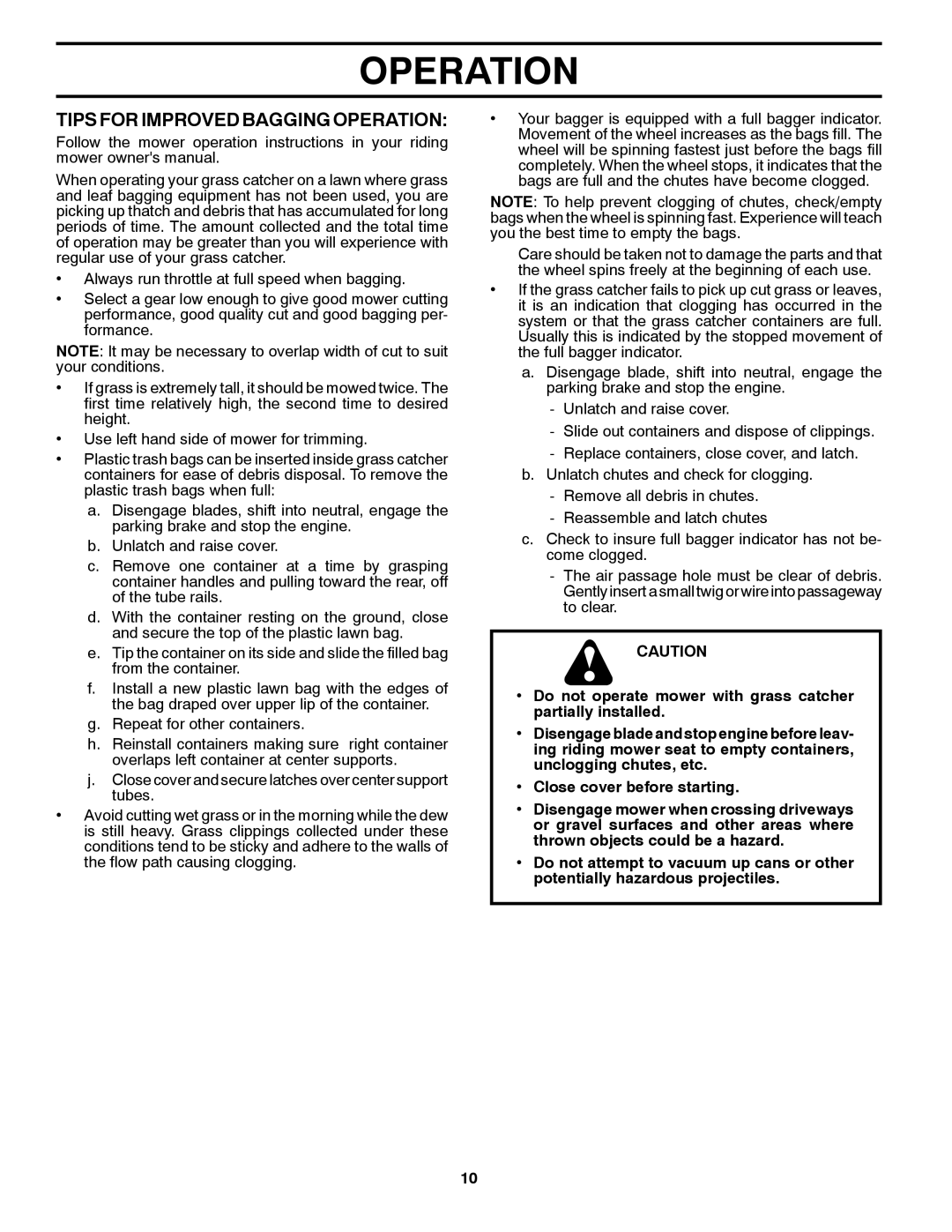
OPERATION
TIPS FOR IMPROVED BAGGING OPERATION:
Follow the mower operation instructions in your riding mower owner's manual.
When operating your grass catcher on a lawn where grass and leaf bagging equipment has not been used, you are picking up thatch and debris that has accumulated for long periods of time. The amount collected and the total time of operation may be greater than you will experience with regular use of your grass catcher.
•Always run throttle at full speed when bagging.
•Select a gear low enough to give good mower cutting performance, good quality cut and good bagging per- formance.
NOTE: It may be necessary to overlap width of cut to suit your conditions.
•If grass is extremely tall, it should be mowed twice. The first time relatively high, the second time to desired height.
•Use left hand side of mower for trimming.
•Plastic trash bags can be inserted inside grass catcher containers for ease of debris disposal. To remove the plastic trash bags when full:
a.Disengage blades, shift into neutral, engage the parking brake and stop the engine.
b.Unlatch and raise cover.
c.Remove one container at a time by grasping container handles and pulling toward the rear, off of the tube rails.
d.With the container resting on the ground, close and secure the top of the plastic lawn bag.
e.Tip the container on its side and slide the filled bag from the container.
f.Install a new plastic lawn bag with the edges of the bag draped over upper lip of the container.
g.Repeat for other containers.
h.Reinstall containers making sure right container overlaps left container at center supports.
j.Close cover and secure latches over center support tubes.
•Avoid cutting wet grass or in the morning while the dew is still heavy. Grass clippings collected under these conditions tend to be sticky and adhere to the walls of the flow path causing clogging.
•Your bagger is equipped with a full bagger indicator. Movement of the wheel increases as the bags fill. The wheel will be spinning fastest just before the bags fill completely. When the wheel stops, it indicates that the bags are full and the chutes have become clogged.
NOTE: To help prevent clogging of chutes, check/empty bags when the wheel is spinning fast. Experience will teach you the best time to empty the bags.
Care should be taken not to damage the parts and that the wheel spins freely at the beginning of each use.
•If the grass catcher fails to pick up cut grass or leaves, it is an indication that clogging has occurred in the system or that the grass catcher containers are full. Usually this is indicated by the stopped movement of the full bagger indicator.
a.Disengage blade, shift into neutral, engage the parking brake and stop the engine.
-Unlatch and raise cover.
-Slide out containers and dispose of clippings.
-Replace containers, close cover, and latch.
b.Unlatch chutes and check for clogging.
-Remove all debris in chutes.
-Reassemble and latch chutes
c.Check to insure full bagger indicator has not be- come clogged.
-The air passage hole must be clear of debris. Gently insert a small twig or wire into passageway to clear.
CAUTION
•Do not operate mower with grass catcher partially installed.
•Disengage blade and stop engine before leav- ing riding mower seat to empty containers, unclogging chutes, etc.
•Close cover before starting.
•Disengage mower when crossing driveways or gravel surfaces and other areas where thrown objects could be a hazard.
•Do not attempt to vacuum up cans or other potentially hazardous projectiles.
10
